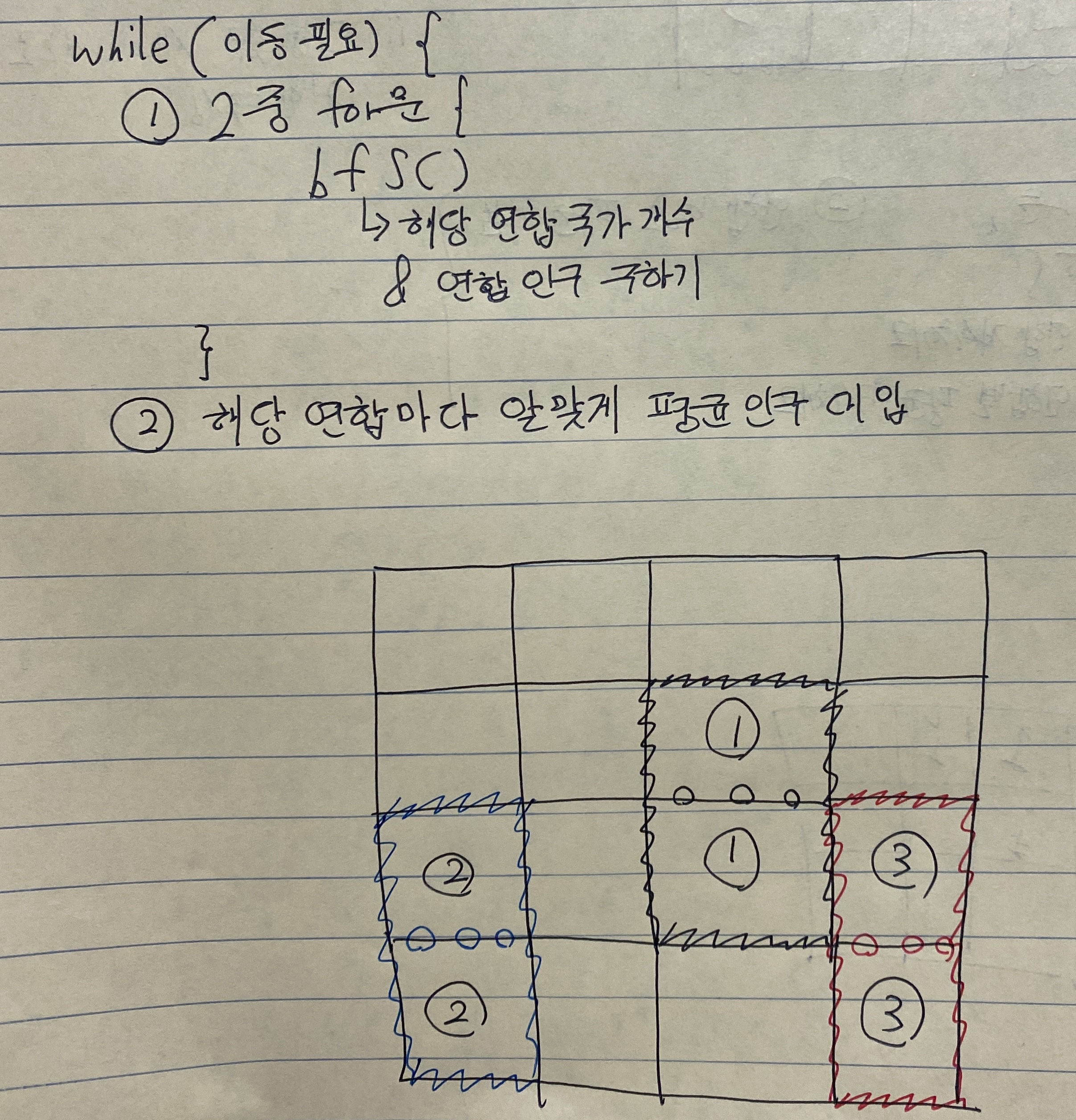[16234번 인구 이동]
https://www.acmicpc.net/problem/16234
개인적으로 플레5 난이도의 큐빙보다 어려웠다.
[5373 큐빙]
https://www.acmicpc.net/problem/5373
풀이
아이디어를 떠올리기까지는 오래 걸리지 않았다. 2중 for문으로 나라 전체를 돌면서 BFS(혹은 DFS)를 통해 마치 바이러스가 퍼지듯이 연합을 찾아주고, 각각의 연합에 맞게 평균 인구 수를 대입해준다.
더 이상 인구 이동이 일어나지 않을 때까지 반복하고 며칠 간 이동이 일어났는지 출력하면 된다.
주의할 부분은 하루에 연합이 여러 개 생성될 수 있고, 각 연합마다 평균 인구 수가 다를 수 있다는 점이다. 처음에 이 부분을 생각치 못했고 그대로 돌아올 수 없는 강을 건넜다. 이 부분을 떠올렸을 때는 이미 너무 녹초가 되어있어서 더 이상의 코딩이 불가능했다. 다음 날 다시 풀었고, 다행히 정답을 맞출 수 있었다.
매우 간략한 수도코드로 적어보자면 다음과 같다.

C++ 코드
#include <iostream>
#include <cstring>
#include <algorithm>
#include <cmath>
#include <queue>
#include <vector>
#include <utility> // pair
#include <tuple>
#include <stack>
#define ll long long
#define INF 1e9
using namespace std;
int n,L,R;
int map[52][52];
int open[52][52];
int dr[] = {0,1,0,-1};
int dc[] = {1,0,-1,0};
int day = 0;
int unions = 0;
vector<int> avgs;
bool needMove() {
for(int i=1;i<=n;++i) {
for(int j=1;j<=n;++j) {
for(int d=0;d<4;++d) {
int ni,nj;
ni = i+dr[d];
nj = j+dc[d];
int home = map[i][j];
int adj = map[ni][nj];
if(L <= abs(home-adj) && abs(home-adj) <= R) {
return true;
}
}
}
}
return false;
}
void bfs(int r, int c) {
int countries = 1;
int population = map[r][c];
queue<pair<int,int> > q;
q.push(make_pair(r,c));
open[r][c] = unions;
while(!q.empty()) {
pair<int,int> p = q.front();
q.pop();
r = p.first;
c = p.second;
for(int d=0;d<4;++d) {
int nr,nc;
nr = r+dr[d];
nc = c+dc[d];
if(open[nr][nc]) {
continue;
}
int home = map[r][c];
int adj = map[nr][nc];
if(L <= abs(home-adj) && abs(home-adj) <= R) {
open[nr][nc] = unions;
countries++;
population += map[nr][nc];
q.push(make_pair(nr,nc));
}
}
}
avgs.push_back(population / countries);
return;
}
void sol() {
while(true) {
memset(open,0,sizeof(open));
if(!needMove()) {
break;
}
day++;
unions = 0;
avgs.clear();
avgs.push_back(-1); // dummy value
for(int i=1;i<=n;++i) {
for(int j=1;j<=n;++j) {
if(!open[i][j]) {
for(int d=0;d<4;++d) {
int ni,nj;
ni = i+dr[d];
nj = j+dc[d];
int home = map[i][j];
int adj = map[ni][nj];
if(L <= abs(home-adj) && abs(home-adj) <= R) {
if(!open[ni][nj]) {
unions++; // increase the number of unions
bfs(i,j);
}
}
}
}
}
}
// average the population
for(int i=1;i<=n;++i) {
for(int j=1;j<=n;++j) {
if(open[i][j]) {
int unionNum = open[i][j];
map[i][j] = avgs[unionNum];
}
}
}
}
return;
}
int main(void) {
// ios_base :: sync_with_stdio(false);cin.tie(NULL);cout.tie(NULL);
scanf("%d%d%d", &n,&L,&R);
for(int i=0;i<52;++i) {
for(int j=0;j<52;++j) {
map[i][j] = INF;
}
}
for(int i=1;i<=n;++i) {
for(int j=1;j<=n;++j) {
scanf("%d", &map[i][j]);
}
}
sol();
printf("%d\n", day);
return 0;
}채점 결과

